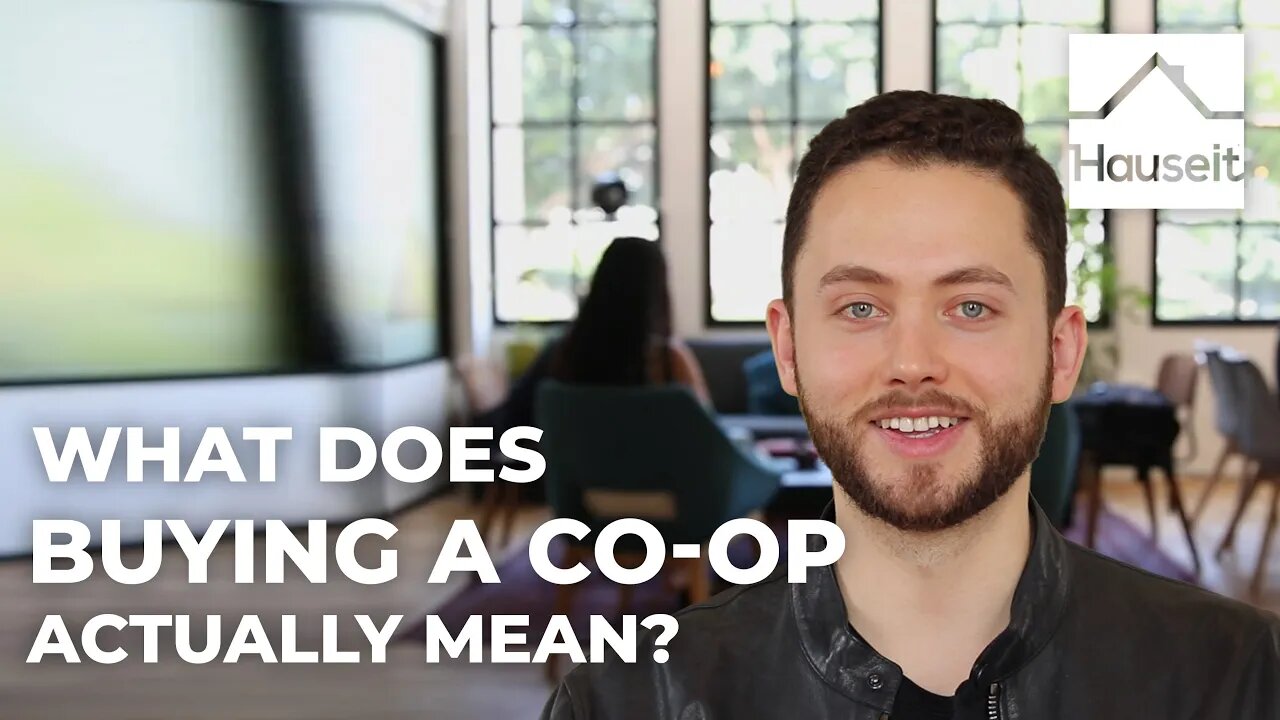Premium Only Content

What Does Buying a Co-op Actually Mean?
Save 2% When Buying in NYC: https://www.hauseit.com/hauseit-buyer-closing-credit-nyc/
NYC Buyer Closing Cost Calculator: https://www.hauseit.com/closing-cost-calculator-for-buyer-nyc/
So, what does buying a co-op actually mean? We’ll demystify this topic in the following video. My name is Nick, I'm at Hauseit here in New York City. We are a reduced commission platform for buyers and sellers established in 2014. If you're looking to save money and you're buying or selling visit our website https://www.hauseit.com to learn about ways to save. Now let's get started.
So, what does buying a co-op actually mean? Well in layman's terms buying a co-op simply means that you're buying an apartment. There are two types of apartments to buy in the city of New York: one is a condo and one is a co-op. Now the majority of apartments in New York City are co-ops, and that's just because there's a greater supply. Now the main difference between buying a condo and a co-op comes down to the underlying ownership structure of the apartment. When you buy a condominium, you're buying real property. It's the same as buying a house or a piece of land. You receive a deed for your particular apartment and you own that property outright considered to be real property.
Now buying a co-op on the other end is not real property. In fact, it's considered personal property and technically when you buy a co-op, you’re actually buying shares in a private corporation that owns the cooperative building. When you buy a co-op, you receive a co-op stock certificate as well as a proprietary lease which entitles you to live in the particular apartment that you've purchased.
Aside from the technicalities of the ownership structure between condos and co-ops, the main difference between a condo and a co-op comes down ultimately to two things. One of which is the purchase application process. In a co-op, you can be rejected by the building and that is a real risk. Now with a condo there is no such risk in the sense that the condominium cannot reject your application to buy the apartment unless they themselves agree to buy the apartment at the same price as you've offered to the seller. Secondly, co-ops generally have pretty sizable restrictions on subletting. The reason being is that co-ops are generally intended for owner occupancy. So, coops don't like people to buy the place particularly investors with the idea of just renting it out indefinitely.
So, between the fact that coops have subletting restrictions and they have the purchase application process, there are a number of downsides to buying a co-op. Consequentially, investors do not usually consider co-ops. So, you have a slightly smaller buyer base for coops compared to condos and furthermore there are more coops in the city than condos. So, that combination of greater supply and less demand creates a much lower pricing for co-ops in the city. A co-op can be 10% to 40% less expensive than an identical condo essentially on the same block in a different building.
So, there you have it. Buying a co-op simply means you're buying a specific type of apartment in New York City. Most apartments are co-ops, and before we let you go we'll quickly talk about the benefits of buying a co-op. We already mentioned that they're less expensive but they also have lower buyer closing costs. Whereas with a condo if you're financing, you could face a buyer closing cost bill of around 4% with a co-op your bill would be closer to 2%. The reason for this comes down to the fact that buying a co-op is not considered to be real property and there are two specific closing costs that technically only apply to real property. One of which is the mortgage recording tax and the other is title insurance because a co-op does not require these two items that's how co-op buyer closing costs are around 2% less and for your comparable condo in the city. Now if you have unlimited resources you should probably buy a condo but the reality is, we're all budget constrained in New York City. Buying a co-op can actually be a better choice for many New Yorkers who need more space particularly if you find a building that is more reasonable and doesn't have too many restrictions on subletting.
We have videos on each of these topics on the Hauseit YouTube channel. Thank you so much for watching and if you enjoyed this video, we'd love to have you as a subscriber and we'd love to hear any comments or feedback that may be on your mind thank you so much.
Save 2% When Buying in NYC: https://www.hauseit.com/hauseit-buyer-closing-credit-nyc/
NYC Buyer Closing Cost Calculator: https://www.hauseit.com/closing-cost-calculator-for-buyer-nyc/
.
.
Hauseit LLC, Licensed Real Estate Broker
Tel: (888) 494-8258 | https://www.hauseit.com
_
#hauseit #hauseitnyc
-
 2:57:41
2:57:41
Laura Loomer
8 hours agoEP91: BIG TECH BILLIONAIRE TAKEOVER: Will MAGA Get the Justice We Deserve?
85K110 -
 1:11:49
1:11:49
Man in America
13 hours agoWhat They're HIDING About Europe's RAPE CRISIS Will SHOCK You
49.4K66 -
 5:41:33
5:41:33
The Sufari Hub
8 hours agoUPGRADING OUR GEAR : Fallout 4 : BEATING MAIN STORY FOR THE FIRST TIME!
26.3K -
 1:04:50
1:04:50
PMG
16 hours ago $4.69 earnedTraditional Southern Values Ain't Dead Yet w/ Stacy Lyn Harris
42.6K1 -
 1:26:43
1:26:43
Kim Iversen
11 hours agoHOLY SH*T! Zuckerberg DROPS CENSORSHIP Policy—Is Free Speech BACK? | Trump’s AMBITIOUS Move to Claim Greenland, Panama Canal & Canada
76.9K203 -
 1:36:15
1:36:15
Glenn Greenwald
12 hours agoWhat Mark Zuckerberg’s New Misinfo Policy Means For Internet Freedom; The Disinformation Complex: Dismantled At Last? | SYSTEM UPDATE #384
124K100 -
 1:16:42
1:16:42
Adam Does Movies
16 hours ago $2.50 earnedHUGE Movies Releasing In 2025! + Movie News - LIVE!
37.7K3 -
 58:40
58:40
Flyover Conservatives
12 hours agoZuckerberg’s Shift: The Mar-a-Lago Effect or Strategic Realignment? - Clay Clark | FOC Show
37.3K4 -
 3:41:55
3:41:55
The Original Next Level Gaming
9 hours agoTuesday Night Live W/ Peter & Mike: The Return to Remnant II
31.7K4 -
 1:28:24
1:28:24
Anthony Rogers
13 hours agoEpisode 351 - Is Cancel Culture Over?
20.7K3